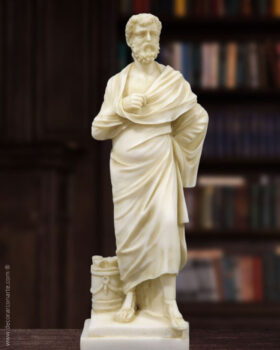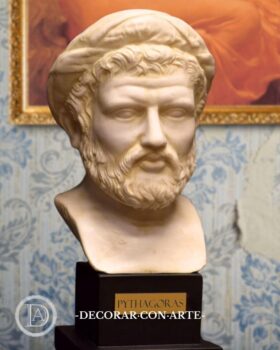Description
Mosaic “Epictetus”, reproduction of a Roman mosaic, completely handmade, using the same techniques as two thousand years ago.
Measurements:
Width: 24 cm. Height: 15 cm.
The technique used is “opus teselarium”, a mosaic made with cubic stone tesserae.
Tesserae of up to 8 mm of natural stone and marble have been used in its manufacture. Fixed in mortar with a metal structure. Ready to be hung on the wall or as flooring on the floor. Mosaic reproductions inspired by classical art. Ideal for decoration and gifts.
Mosaic “Epictetus”, reproduction of a mosaic with the name “Epictetvs”.
Epictetus (55 AD – 135 AD) was a Greek philosopher of the Stoic school. He spent part of his life as a slave to Epaphroditus, a freedman secretary of Nero, and it is unknown when he was manumitted. In the year 93, he was exiled along with other philosophers residing in Rome by order of the emperor Domitian. In the Greek city of Nicopolis, Epictetus founded a school where he taught the principles of Stoic philosophy.
Epictetus has left a profound mark on philosophy with his practical approach to achieving inner tranquility and his emphasis on ethical living. Born as a slave, he lived by the teachings of Stoic philosophy, which advocates accepting what cannot be changed and focusing on what is within our control: our approach to circumstances, our reactions to them, our emotions, actions, and attitudes. Epictetus’s thinking continues to inspire those seeking to cultivate virtue and achieve serenity.
” Men are not so much concerned with real problems as with their imagined anxieties about real problems”. (Epictetus)
“Join what is spiritually superior, regardless of what other people think or do. Keep your true aspirations no matter what is happening around you.” (Epictetus)
Read more about the Stoic philosophers on our blog: Stoic Philosophers, a model of Strength and Joy



















Reviews
There are no reviews yet.